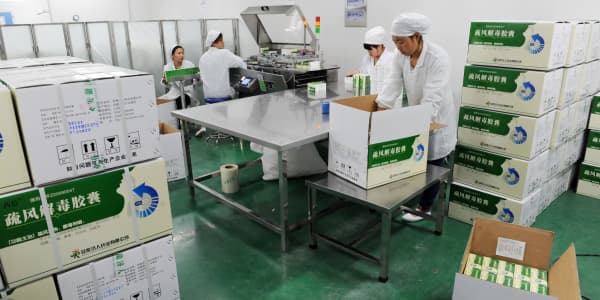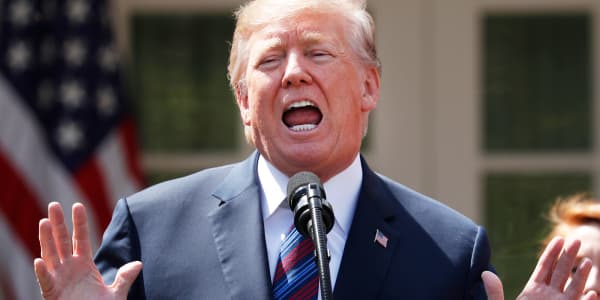Rising protectionism in the West has become a threat to Asia's prosperity, Tommy Koh, ambassador-at-large for Singapore's Ministry of Foreign Affairs, said Thursday.
"I worry about the rise of protectionism and economic nationalism in the U.S. and in Europe. I see this as a direct threat to the prosperity and prospects of Asia," Koh said at the Credit Suisse conference on megatrends, held in Singapore.
"Asia has been able to make enormous progress because of the liberal economic order that the U.S., U.K. and other countries created at the end of the Second World War. And this liberal world order seems to be in jeopardy."
Protectionist rhetoric ramped up during the U.S. presidential election last year.
Then-candidate Donald Trump ran on a platform promoting "fair trade" practices that would prove better for the U.S., with much of the rhetoric aimed at China and Mexico.
Although Trump has since walked back some of the rhetoric – earlier this month he said he wouldn't label China a currency manipulator – he has continued to target U.S. trade partners, calling Canada's actions on dairy a "disgrace" on Thursday and launching a probe of cheap steel exporters, including China.
David Mulford, a former U.S. ambassador to India during the George W. Bush administration and a Treasury Department official during the Ronald Reagan administration, shared the conference stage with Singapore's Koh and defended the shift on trade.
"The U.S. position over all these years we've been talking about has been to promote and assist the rise of other nations. It is an extraordinary historic performance by a strong country," Mulford said. "In doing so, we have created all kinds of rivals and this has caused hitches and glitches and problems in the system, which now have to be addressed and it's appropriate that we address them."
Mulford, who is currently a visiting fellow at the Hoover Institution at Stanford University, which bills itself as non-partisan but is often viewed as conservative, did not specify what systemic problems he believed needed to be addressed.
Mulford also went on the attack against claims the U.S. had grown overly protectionist: "There is no shortage of protectionism in Asia. Let's be frank about that. It is a major part of the Asian economic approach."
But Singapore's Koh was unconvinced.
"It is not fair for you to say there is protectionism everywhere, including Asia, so what's the big deal about the U.S. turning protectionist. The trend in Asia is in the other direction. We are opening up the economies, liberalizing, integrating with one another," he said. "The trend in America and Europe is a worry, because you are going in the other way. There is a significant difference between the dominant trend in Asia — which is towards opening up the economy, liberalizing, integrating — and the trend in the West."
Singapore and the U.S. signed a free trade agreement in 2003. But more recently, Trump pulled the U.S. out of the Trans-Pacific Partnership, or TPP, a broad 12-nation trade deal, which the U.S. president claimed was a "disaster" that would hurt U.S. manufacturing.
Mulford defended the Trump administration's stated preference for bilateral trade deals.
"Are there benefits to be derived by bilateral trade agreements versus ambitious global trade agreements," he asked. "I think smaller countries that are competitive, aggressive confident could do very well in bilateral trade negotiations and don't always have to be involved in a large package that makes it harder to negotiate a variety of different things rather than a one-on-one situation."
To be sure, some analysts believe the multi-lateral approach is more efficient, as trade deals generally take many years to complete and small nations often can't field large teams to negotiate many bilateral deals simultaneously.
But Mulford claimed "world elite" and "negative" media have been preventing discussion of ways to "address the legitimate concerns of the groups that have been disadvantaged in leading countries like the U.S. by the rise of other nations and the growth of globalization."
Singapore's Koh, however, remained steadfast in criticism of the U.S.'s new trade tact, noting that America had gone down that road before, with ill effects.
Koh pointed to the Smoot-Hawley Tariff Act of 1930, which increased U.S. tariffs on a range of imports, setting off a trade war and deepening the Great Depression as by some estimates it halved American imports and exports.
"You've been there before and I'm surprised that memories are so short in America and Americans are flirting with protectionism a second time," Koh said.
—By CNBC.Com's Leslie Shaffer; Follow her on Twitter @LeslieShaffer1





